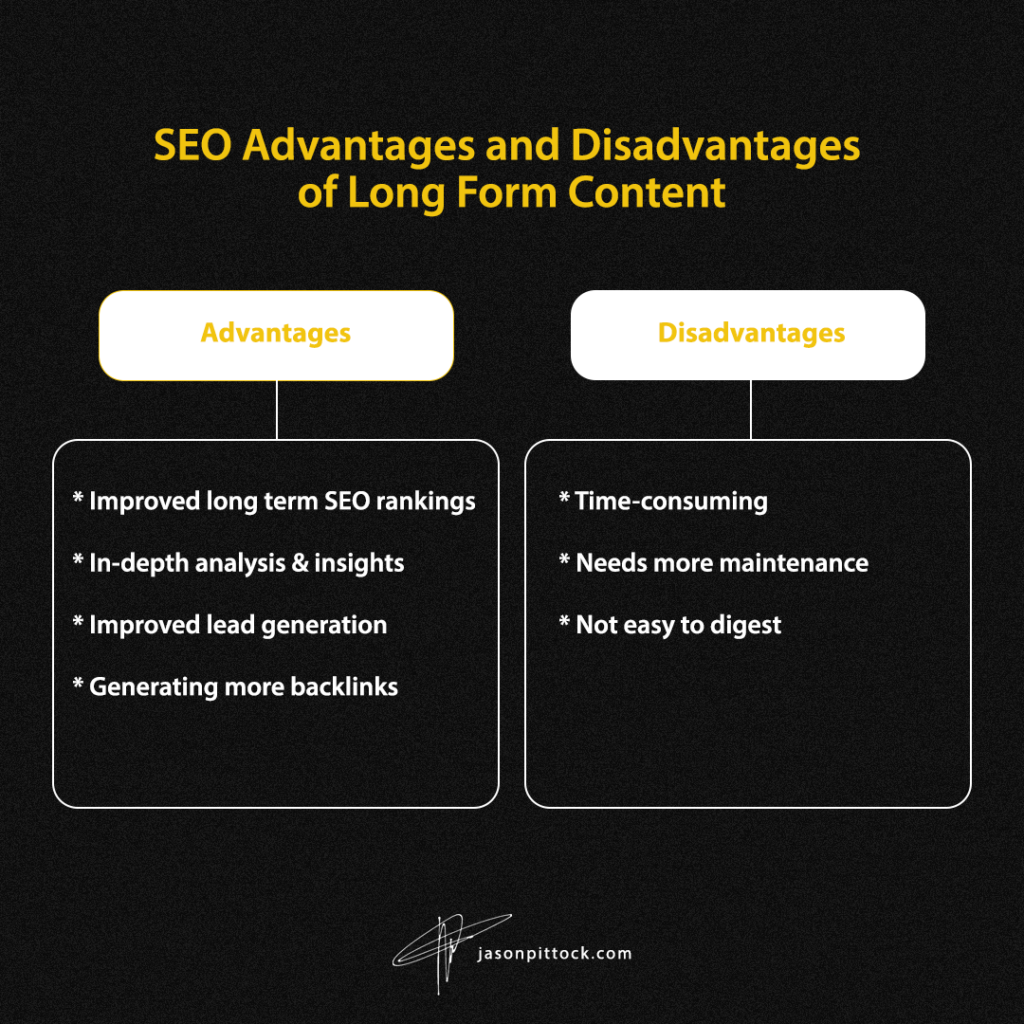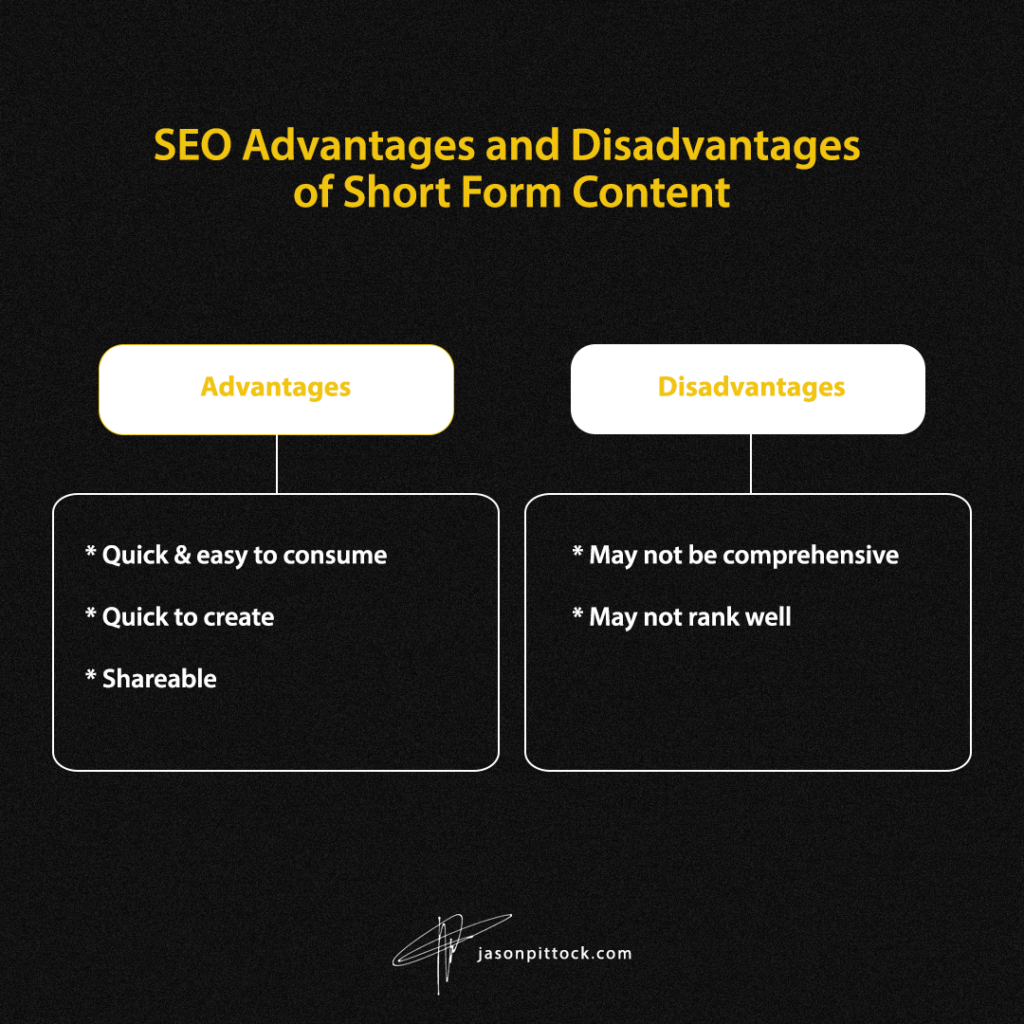
You'd be hard-pressed to not be confused by today's digital marketing space. Do this, don't do that, oh, no, but that's wrong too -- that would be a pretty common research path for anyone trying to figure out where to take their business in terms of digital marketing. And in this world of perpetual conundrums, long form vs short form content seems to be one of the single most widespread debates.
Which one's best, though? Does long form content win, or should you focus on short form? Where should you put (most of) your energy?
The arguments are compelling on both ends -- but the reality might not be as simple as a "this or that" game. In this article, I'll dive into some of the essential matters you should consider before deciding on long form vs short form content, and how understanding the right use of long form or short form content will contribute to your SEO strategy
Long form content is defined as anything over 1,200 words (with some specialists classifying anything over 1,000, 1,500, or 2,000 words as "long form"). In essence, though, any type of content that's comprehensive, in-depth, and takes more than five minutes to be read can generally be considered as "long form." This could be a blog post, an article, a whitepaper -- anything that takes up more than a couple of pages or so (on average).
Long form content has a few Search Engine Optimization (SEO) advantages that make it compelling for certain businesses and strategies. These include:
There's a reason people debate on whether long form content should be the main type of content in one's strategy and that is... long form content isn't perfect. There are some disadvantages to creating long form content, and some of the main ones include:
As a general rule, content marketers refer to "short form content" as anything under 1,200 words. This could be a blog post, an article, a social media update, etc.
Short form content has some very particular and interesting SEO advantages that make it compelling for certain businesses and strategies. These include:

As you'd expect, short form content also has some disadvantages that should be considered before deciding whether or not to use it. These include:

Now that we've gone over the advantages and disadvantages of long form and short form content, let's take a look at the data to see if one is really better than the other. After all, everyone's got an opinion, but data doesn't lie, right? (Spoiler alert: things are rarely black and white, and data is just part of the story.)
According to the Semrush State of Content Marketing Report 2022, articles with over 3,000 words get 138% more traffic. And there's more to it: articles under 500 words are not only performing worse in SERPs, but they're less shared too.
Add this to the fact that 47% articles with complex heading structure (i.e. which have H2s, H3s, and even H4s in their structure) perform better, and things would seem crystal-clear: long-from is better.
Here's where things get complicated, though.
SEO-wise, longer pieces do better.
But the average internet user's attention span is of about 8 seconds (which is actually four seconds less than it was in 2,000).
"Sure, but when someone's really interested in something, they'll read about it, right?"
Well, you're not wrong. But research shows that the average time spent on a website ranges between 44 and a whooping 82 seconds, depending on the industry (with B2B at the higher end of the spectrum). That's less than one and a half minutes to get someone's attention and make them want to come back to your website/ become a potential customer.
Based on these statistics, we can say that those who tout the importance and efficiency of short form content aren't incorrect either. Short-form does better from a myriad of points of view, and this is probably best understood when we look at the fact that the average person spends 147 minutes on social media every day. More even, TikTok, the quintessential short-form video social media channel, has grown in popularity to the point where Android users spend nearly 20 hours on the platform, every month. Again, a sign that (some categories of) content are better consumed in small bites.
Data isn't that crystal clear on whether long form vs short form content should be the go-to content marketing tactic.
OK, but if we look at some of the most popular pieces of content on the internet, which type of content wins? Is it the short form or the long form?
Well, if we look at both short form and long form content examples, we'd be... just as confused as we are now.
TechCrunch, Mashable, and Smart Passive Income are three of the most popular blogs in the business and tech space. They all produce long-form content (or at least most of the time.)
Some of the most popular YouTube influencers, we'd notice they produce not only a lot of content but also content that leans towards the longer format (think of PewDiePie or Cocomelon YouTube channels.)
On the other hand, content shared on LinkedIn and in Twitter threads seems to be gaining a lot of popularity as well. These would both fall into the "short form content" examples, and the rising acclaim of influencers who have made a name for themselves on these platforms stands as proof of people's interest in short-form content. If you're curious, just check out Justin Welsh on LinkedIn, a prime example of how to turn your ideas in short nuggets of info people digest at the swipe of a fingertip (literally.)
Let's look at a different type of content example. Let's say you manage a blog for a company that sells software. You could:
a) Write a long-form article on the different types or use cases of software your company offers, their advantages and disadvantages, and how to choose the best one according to needs.
b) Create a series of short-form videos (under one minute each) highlighting the features of each software product and what makes them unique.
c) Create a Twitter thread with the essential nuggets of information from the long-form article.
d) Write a short blog post on one of the software's practical applications and include a link to the long form article for those who want to learn more.
Which one should you choose?
The correct answer is (drum rolls): it depends.
This is where we segue into the main point of this entire article: should you do long form content or short form content?
Circling back to the last sentence of the previous section, it depends.
On what?
Well, the winner in the long form vs short form content debate depends on: